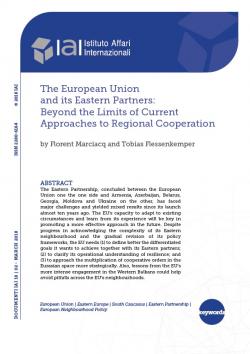The European Union and its Eastern Partners: Beyond the Limits of Current Approaches to Regional Cooperation
The Eastern Partnership, concluded between the European Union one the one side and Armenia, Azerbaijan, Belarus, Georgia, Moldova and Ukraine on the other, has faced major challenges and yielded mixed results since its launch almost ten years ago. The EU’s capacity to adapt to existing circumstances and learn from its experience will be key in promoting a more effective approach in the future. Despite progress in acknowledging the complexity of its Eastern neighbourhood and the gradual revision of its policy frameworks, the EU needs (1) to define better the differentiated goals it wants to achieve together with its Eastern partners; (2) to clarify its operational understanding of resilience; and (3) to approach the multiplication of cooperative orders in the Eurasian space more strategically. Also, lessons from the EU’s more intense engagement in the Western Balkans could help avoid pitfalls across the EU’s neighbourhoods.
Report of the Eastern Partnership Reflection Forum entitled “The European Union and its Eastern Partners. Current Approaches to Regional Cooperation”, held in Minsk on 10-12 December 2017 in the framework of the Belarusian Presidency of the Central European Initiative.
-
Details
Roma, IAI, March 2018, 22 p. -
In:
-
Issue
18|02
Introduction
1. More differentiation, more ownership, more of the same?
2. A new EU strategic approach: more resilience?
3. More compatibility across Europe’s regional cooperative orders?
Conclusion: Regional cooperation across EU neighbourhoods
References
Programme
Topic
Tag
Related content
-
Event11/12/2017
The European Union and its Eastern Partners
leggi tutto



